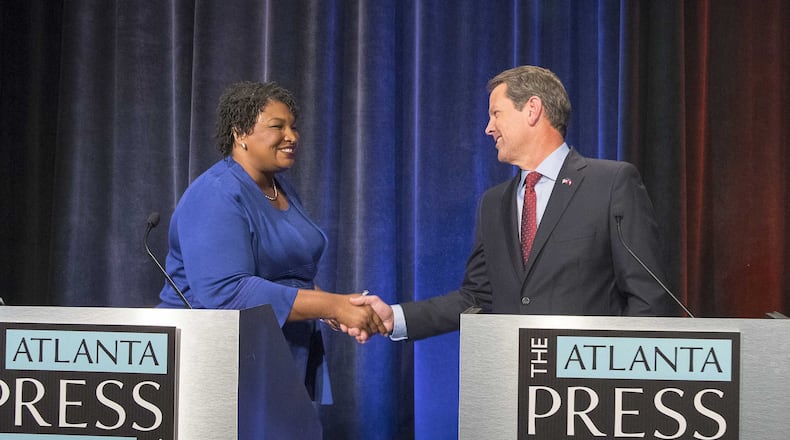In recent weeks, Gov. Brian Kemp’s legal team has fought a subpoena looking into Trumpian skullduggery following the 2020 election.
Two years ago, Kemp acted admirably, and some might even say bravely, in pushing back against his own party’s lies that the election was stolen. He put his political hide at risk doing so. One might think Governor Shotgun would have no problem going into a Fulton County Grand Jury and telling that secretive, investigative-minded panel what he knows.
But Kemp is worried what he says can and will be used against him — not criminally, because he acted lawfully. But his words might be damaging politically because former President Donald Trump and his most ardent supporters were furious that our governor didn’t bend the rules. In this twisted alternate universe, doing your job lawfully is not a good thing.
Team Kemp has argued vehemently in court motions that Fulton DA Fani Willis, a Democrat, is using the grand jury to politick. It is simply outrageous, they argue, that the election rematch against Stacey Abrams is just two months away and here’s the DA playing politics.
In a hearing last month, Kemp attorney Brian McEvoy told Fulton Judge Robert McBurney, “this high profile and politically charged investigation and governor Kemp’s role in it are reaching a crescendo.” He added that “the intersection of law and politics” in this case “shouldn’t be happening on the eve of an election.”
The judge agreed to push Kemp’s testifying until after the November election.
“The Governor is in the midst of a re-election campaign and this criminal grand jury investigation should not be used by the district attorney, the governor’s opponent or the governor himself to influence the outcome of that election,” McBurney wrote in an order. “The sound and prudent course is to let the election proceed without further litigation or other activity concerning the governor’s involvement in the special purpose grand jury’s work.”
Credit: TNS
Credit: TNS
Ah, “prudence” wins a rare battle in the Georgia political landscape.
But on the morning of Sunday, Nov. 4, 2018, the Kemp forces were not thinking about discretion. They were desperate. Kemp was in a tight race with Abrams. It was barely 48 hours away from polls opening. And embarrassing news about Kemp’s office was about to splash out.
Kemp at the time was the GOP’s gubernatorial candidate and also the secretary of state, who was sworn to look after the state’s elections. Some people thought he’d have a hard time performing both jobs, that there was an inherent conflict of interest. Candidate Kemp told naysayers not to worry, that this Secretary of State Kemp fellow was forthright and ethical. There’d be no thumb on the scale.
At 4:47 a.m. that Nov. 4, the secretary of state’s office got an email from the online news site WhoWhatWhy, saying it was going to report about a security snafu with the department’s election website that allowed some voter information to be possibly vulnerable.
An hour later, and minutes before the story was to run, Kemp’s office posted a statement on its election page: “AFTER FAILED HACKING ATTEMPT, SOS LAUNCHES INVESTIGATION INTO GEORGIA DEMOCRATIC PARTY.”
Yes, it was in all caps, just like Gramps might do in a email to let you know “THIS IS REALLY IMPORTANT!!!!!”
That morning I wrote to a friend working in that office: “Boy, Kemp’s last-minute claim smells awful fishy. It’s one thing to say someone breached the system. It’s another to go straight in and accuse the Dems.”
I heard nothing back.
About that time, Candidate Kemp’s campaign released a statement claiming the Democrats attempted “a fourth-quarter Hail Mary pass that was intercepted in the end zone.”
“These power-hungry radicals should be held accountable for their criminal behavior,” the campaign said.
Credit: Hyosub Shin/AJC
Credit: Hyosub Shin/AJC
Except it wasn’t the Dems.
What actually happened was a man named Richard Wright, a techie from Roswell, checked on the Secretary of State website to make sure his registration info was correct. After discovering that other voter information was available, Wright made some inquiries and contacted the lawyer suing Georgia over its voting machines. He also reached out to the Democratic Party of Georgia.
According to a later investigation by the AJC’s Mark Niesse, “They passed along his concerns, which soon reached the FBI, the National Security Agency, the GBI, the Abrams campaign, Georgia Tech professors and attorneys for the secretary of state’s office.”
Kemp’s campaign, with potential egg dripping from its face, quickly decided the best defense was an offense. They immediately blamed the opposition.
But after an investigation, the GBI found there was no hacking.
This week, I asked Kemp’s (2022) campaign to explain the disconnect between this year’s demands for “prudence” two months before the election and the scorched-earth, last-minute tactics of 2018.
They said: “In 2018, the Secretary of State’s office referred a time-sensitive matter regarding election security to authorities, which the Attorney General’s office later concluded was appropriately addressed to law enforcement. Comparing the two issues is completely absurd, but makes for an entertaining column.”
I sure hope so.
About the Author
Keep Reading
The Latest
Featured





